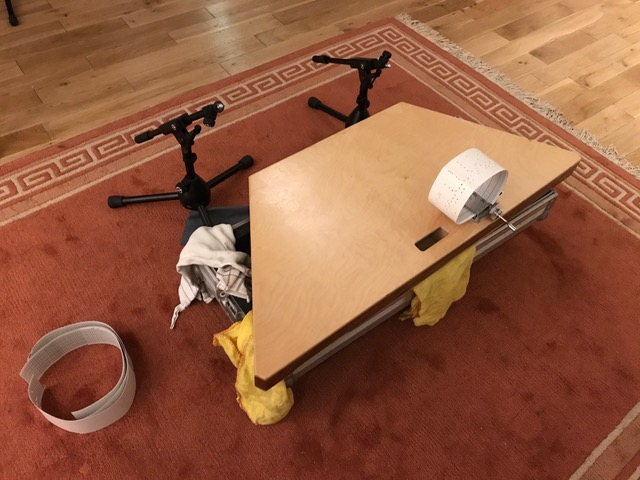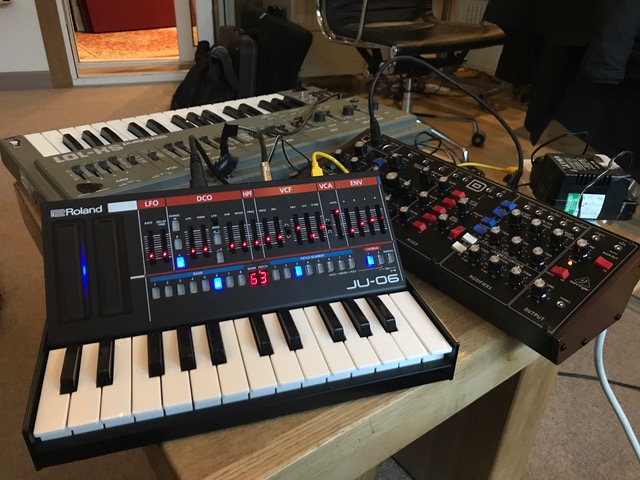Lockdown Laydown by Alison Eales: Glasgow Music Walking Tour Guest Blog
While we can’t walk’n’roll just yet, we are looking forward to welcoming guests on our music tours as soon as we get the green light. In the meantime, we are excited to present this blog from one of our guides, the supremely talented Alison Eales.
In addition to her work as a tour guide for Glasgow Music City Tours, she is also a music researcher, a doctor of jazz (nice….) and a musician. Alison is a member of Glasgow indie pop troupe Butcher Boy and of the sublime Glasgow Madrigirls choir but she also writes and performs her own material. Over the past year or so, she has been working on her first solo album, we’ve heard it and it’s beautiful stuff. Here she documents the making of the record.

Photography by Brian Sweeney
In March 2019, along with fellow GMCT guides Fiona and Alison, I attended the launch of a new network called Scottish Women Inventing Music (SWIM). It gave me the chance to talk to other musicians about their plans and projects, and also to learn about funding opportunities. I left the event feeling determined to finally get going on something I had wanted to do for a long time: make an album of my own. I’ve been making music for years as a member of the band Butcher Boy and a singer in the Glasgow Madrigirls choir, but I’ve never done very much under my own name. I was fortunate enough to get a bit of funding from Creative Scotland to get me started, and kicked 2020 off with an intense period of redrafting lyrics, writing arrangements, programming drum machines, practising, and making plans for my studio time.
I also bought a Pocket Operator and started taking it with me everywhere I went. It’s a tiny sampler and sequencer, and it is absolute magic: you can use it to record sound, and then turn that sound into beats and tunes. A couple of my lyrics mention the Glasgow subway, and I had wanted to somehow capture that in the music. This little gadget allowed me to make a rhythm track based on the sounds of the train doors opening and closing, along with a little melody made out of the ‘ping’ of the turnstiles.

I’ve been working with Paul Savage at Chem19 .My first studio session was in February 2020 (day one memorably included recording a spooky little music box on an upturned dulcimer), at which time the news about the coronavirus was concerning, but not alarming. Things were pretty different when I went back into the studio a few weeks later, with lots of anxious conversations about what might be around the corner. I left on the Friday evening with a hard drive full of rough mixes and backups; the following Monday, the UK’s first full lockdown began, and everything went on hold.

Depending on what kind of music you are making, and how you are approaching the process, this early stage of recording can feel a bit awkward. By the time I left the studio in March, the songs were outlined, but not coloured in – little more than rhythm tracks really. It was a strange state to leave them in, and I couldn’t bring myself to listen to them for a long time. It felt like there was a mountain of work left to do, and one or two of the songs were causing me to lose sleep as I just couldn’t work out what to do with them next. Frustratingly, I had hoped to use that second session to bring in other musicians, but was clear that it just wasn’t the responsible thing to do, so the mixes I took away in March sounded a little lonely and airless.
I spent the summer working on a research project about the history of jazz in Scotland, and didn’t give the album a lot of thought. I was finally prompted to revisit it in September when I received an email from Pete Harvey, a fantastic string arranger and producer based in Perth. I had handed responsibility for one song over to him, and he came back with an arrangement that was beyond anything I could have expected, recorded by a string quartet who had played their parts one at a time. It really helped to boost my enthusiasm about the whole project.
For the most part, I was able to bring other musicians in at my next session in November, by which time the risks were better understood and the studio had established its safety guidelines – but one thing I had really wanted to do was to have my fellow Madrigirls singing on a few songs, and sadly this just never became safe or practical. I ended up having to pretend to be a choir, and while the result sounds fine, I will always wonder what those songs would have been like if they had included other voices. I’m sure I am not the only person who will be feeling this way about things they have done over the last year. The restrictions have forced us all to learn new skills in order to solve immediate problems, but we all have strengths and weaknesses, and none of us is good at everything. It’s also been really strange embarking on a creative project during a year that has been characterised by grief and hardship.

I think the album is finished, and now I’m looking for a label with a view to hopefully releasing it this year. Even if the restrictions have resulted in a slightly different record than I might otherwise have made, I’m really glad I’ve done it. I’m also really proud of my Butcher Boy and Madrigirls chums, as we’ve all continued to make music together during the pandemic (watch this space!). The past year has been a testament to the unrelenting nature of the need to make music, and the possibilities offered by technology – but Zoom rehearsals and home recordings will never replace the experience of playing and singing with other people. I can’t wait until we are able to do that again.
